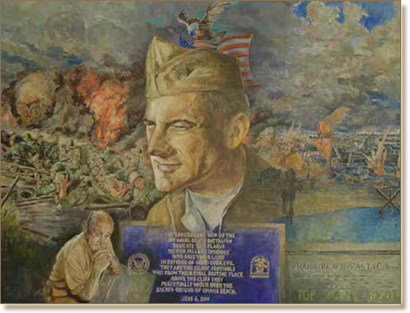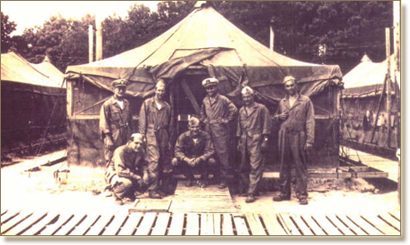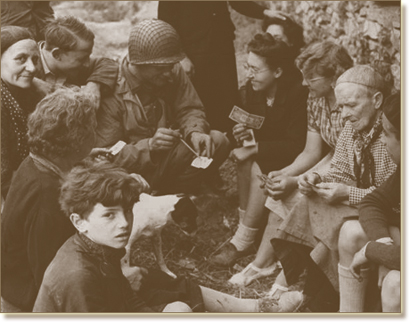Reprinted with permission from Providence magazine, Fall 2001

When a special preview of the movie Saving Private Ryan was shown a couple of years ago in Washington, D.C., Joseph P. Vaghi '42D was one of the members of the distinguished audience invited.
It was a fitting choice, considering he was not only present when the invasion of Normandy took place but played a
key role in its orchestration and subsequent success as beachmaster for Easy Red Beach. These days, he is playing a
different, but equally important, role of getting the word out about the war, the importance of what took place, and
the importance of the U.S. Navy's role in the invasion.
More recently, Vaghi, who resides in Kensington, Md., took that mission all the way to Europe once again, as the
leader of a special group of veterans who returned to place a plaque in honor of the 6th Naval Beach Battalion on
Omaha Beach—57 years after he and his comrades fought there on D-Day, June 6, 1944. The plaque, its inscription
worded by Vaghi and approved by fellow veterans, was a fitting follow-up, as that same unit received its long
overdue Presidential Unit Citation last fall recognizing "extraordinary heroism in military operations against
an armed enemy." It is a moment in time, he said, "that should not be preserved in veterans' minds alone."
"You will remember that for four long years the fate of freedom flickered in the shadow of the world's aggressions,"
Vaghi said in his dedication address when the plaque was placed on the Normandy beach on June 6, 2001. "The men of
the 6th Naval Beach Battalion had great faith that what was ahead of us was right and just. We knew what we were
doing had to be done. … We knew that what we were about to do was in some manner exactly what God wanted us to do."
"Few units paid so heavy a price as the 6th Naval Beach Battalion at Omaha Beach," stated President George W. Bush in
a letter recognizing the battalion's part in the invasion and the placement of the plaque on Omaha Beach. "The
unusual hazards they faced required exceptional daring and courage, yet the 6th Naval Beach Battalion stood tall in
spite of tremendous odds."
50th Anniversary Commemorated
"Do I talk about it?" responded Vaghi. "Yes. It is important to get those who had not come forward to speak about it.
The effect of the war on my generation was incredible," said the World War II veteran, who also later served with a
battalion that invaded Okinawa.
Vaghi didn't always talk about it. He avoided questions, even from his family, he said. Then, his son, Peter, handed
him a pamphlet in 1990 regarding the Normandy Foundation, an organization that was putting together a program to
commemorate the invasion's 50th anniversary. After making a contribution, he was invited to an official ceremony in
Washington, D.C., to celebrate the commissioning of the U.S.S. Normandy later that year. Vaghi was surprised to
discover there were few references made to the Navy's part in what turned out to be the largest amphibious invasion
of all time. Almost immediately, he began working to rectify that oversight, searching out Navy veterans who could
relate their experiences of the invasion and seeing to it that information was included in the official archives.
"Up until that point, I had never talked about it that much," explained Vaghi. "I gathered a lot of material for the
archives. There was nothing in there before about the Navy's role in that invasion!"
In 1994, Vaghi, a former lieutenant commander who was discharged from the Navy in 1947 and who served in the Naval
Reserve until 1959, was asked to represent the Navy at a special ceremony in Normandy, helping to lay a wreath along
with representatives from the other U.S. armed forces. On the way there aboard the QEII, he recalled meeting with
both Walter Cronkite and Andy Rooney of 60 Minutes fame, both of whom interviewed him about his role as beachmaster
and about his experiences during the war. After that trip, he said, his views changed about relating what he had
witnessed during World War II.
"From there on, I became really involved," he explained. "The 50th anniversary really loosened things up."
The following year, Vaghi was again called on, this time as part of a presidential entourage which visited England,
Prague, and Moscow as a follow-up to the anniversary ceremonies. Since that time, he added, he has been actively
involved, speaking about his experiences to civic groups, schools, and in various other venues, as well as gathering
additional information for the National Archives. Those experiences, he added, should never be forgotten, both
because of the horror of war and the heroic efforts made by both Army and Navy personnel on the invasion beaches of
Europe.
Everyone Was Involved
"The war in England had strange beginnings," he recalled. "And when Pearl Harbor occurred, everyone agreed we had to
do something. It's a miracle how people responded. Everyone was involved, from kindergarten kids picking up metal
and bottles along the road to old ladies crocheting. Famous actors, musicians, and comedians like Bob Hope—all went
to war. The response was tremendous! It was probably a phenomenon that had never occurred before but is repeating
itself following the 9/11/01 attack on America."
For his part, Joseph Vaghi graduated from Providence College in December of 1942 and immediately headed for the
University of Notre Dame for special naval training, along with seven other PC graduates. They all completed the
intensive 90-day training, leaving as commissioned ensigns.
"PC had an effect on all of us," he recalled. "We knew what we were doing, and we gave it our all. A lot of the guys
from other colleges dropped out. What I learned in terms of fidelity, honesty, integrity—those were all qualities I
had learned growing up and were reinforced at Providence College. When I left PC, I felt qualified to do anything."
Though they had hoped to be assigned to aircraft carriers or battleships, they found themselves assigned to an
amphibious unit instead. Vaghi went from Notre Dame to Little Creek, Va. (today's eastern base for the Navy SEALS),
to Fort Pierce, Fla., to New York, to Liverpool, England, and then to the southern coast of England to practice
landings.
"We knew what was coming," he said, "but not when. Everyone was prepared for it." Then, "it" came—the invasion of
Normandy.
"A Traffic Cop In Hell"
 |
| |
| Left to right: Beachmaster Joe Vaghi, Beachmaster James Allison,
Beachmaster Karl Hein, Dr. James Collier, Dr. Russ Davey, Beachmaster James Semple and Dr. Ralph Hall
at Fort Pierce Amphibious Training Base in Florida 1943.
|
Vaghi, at only 21, was the beachmaster for Easy Red, one of the sectors on Omaha Beach. As platoon commander of
Platoon C-8, one of the nine platoons in the 6th Naval Beach Battalion, his unit was responsible for all activities
between the low-tide mark and the high-tide mark—some 250 yards of ground—when the invasion actually landed. His
duties were described as similar to a "traffic cop in hell." The unit's tasks included clearing paths and guiding
landing crafts through the series of obstacles the Germans had constructed to stop the invasion. They had to
maneuver around mines, bombs, bullets from enemy machine guns, and the bodies of fallen comrades. Beachmaster
Vaghi would then arrange the casualty evacuation through his medical officer, Dr. James Russell Davey, and Platoon
C-8 corpsmen.
"The carnage was terrible, just terrible," recalled Vaghi. It is a memory that was relived, he said, by viewing the
movie Saving Private Ryan, particularly the first 20 minutes which depict the invasion, leaving little to the
imagination.
"The first 20 minutes was pretty much an accurate reproduction of what happened there," continued Vaghi. "It actually
happened. I was on Red Beach, and the water really was red. Private Ryan gave a lesson up front. [Steven] Spielberg
has done us a service. He has sensitized our country to what it was like."
Vaghi, in recounting his experience, recalled an Army officer, COL George Taylor, commanding his soldiers to move
forward at the time, and telling them, "There are only two kinds of people on this beach—the dead and those who are
about to die."
Vaghi was not one of these casualties. Neither was Edward Gallogly '42D, his college classmate, whom he encountered on
that same beach. Gallogly, who later became lieutenant governor of Rhode Island, was part of a communications unit
which landed in Vaghi's sector on the second day of the invasion. "He saw me and said, 'What the hell are you doing
here?'" recalled Vaghi. "I thought that was pretty cool."
The battalion received the Croix de Guerre (the "Cross of War") from the Provisional French government in 1945. Though
the unit was recommended for a citation some 50-odd years ago, somehow the paperwork had fallen through the cracks.
That was remedied last fall when the 6th Naval Beach Battalion was finally awarded the Presidential Unit Citation
for its part in clearing the way for tens of thousands of Army troops to come ashore. Over 23 percent of the men in
the 6th were either wounded or killed during that invasion.
Vaghi, for his part, received a Bronze Star Medal for heroism in 1945, after removing two gasoline cans and a number
of boxes of hand grenades from a burning Jeep while under fire, preventing more injuries and possible deaths in the
process.
Watching Saving Private Ryan, said Vaghi, was a lot like being back there once more. The most touching part of
Spielberg's movie, he added, was the end, when the main character walks among the graves in a cemetery in Normandy,
kneels at fallen comrade CPT Miller's grave, and prays, "I hope that at least in your eyes I earned what all of you
have done for me. … I tried to live my life the best I could."
"I've walked among all of those crosses," said Vaghi. "My friends are buried there. That was, to me, the thing that
touched me the most."
The 6th Naval Battalion has held reunions for 12 years. Those veterans have begun to tell more and more of their
experiences. Those are memories and experiences, Vaghi added, that should not be forgotten. That is why it is
important for the remaining veterans to tell their stories before it is too late, and the lesson is forgotten as
well, even though these recollections may, at times, be painful.
"If it helps others, because they become more sensitive to the importance of our freedom," he concluded, "then it's
worth it."
 |
| |
|
Commander Joseph P. Vaghi, USNR explains the worth of invasion money on June 19, 1944 to villagers at St.
Laurent Sur Mer, Normandy. Vaghi landed on D-Day at 0735, "Easy Red" Omaha Beach.
|
 Back to Top
Back to Top








